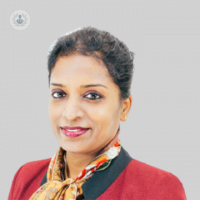Is heavy menstrual bleeding affecting your quality of life? Menstrual disorders explained
Written in association with:Menstrual disorders are a group of wide ranging problems related to periods. Irregular or heavy periods can cause women distress and discomfort and can make day-to-day life a challenge. For expert insight, we asked highly respected consultant obstetrician and gynaecologist Ms Pushpakala Maharajan to explain the causes, symptoms and treatment options for menstrual disorders.

What are menstrual disorders?
Menstrual disorders are conditions that include changes in the periods that women have. This could range from frequent heavy periods to not getting periods at all. So, anything that is outside of the norm, especially when it affects quality of life, is considered a menstrual disorder.
What is the normal pattern of menstruation?
Normally women have three weeks without a period and one week with menstruation. Higher or lower frequencies of menstruation, symptoms of heavy bleeding or a complete lack of periods are classified as menstrual disorders.
Which menstrual disorders are the most common?
The most common menstrual disorder is heavy menstrual bleeding which we call dysfunctional uterine bleeding. It captures roughly one in four of all gynaecological consultations at the GP and thirty to forty per cent of referrals to us as specialists are related to heavy menstrual bleeding and irregular bleeding.
What are the causes of menstrual disorders?
There are a variety of causes of menstrual disorders. When we are investigating a patient’s symptoms, this would involve looking at scans and blood tests for an endocrine profile (hormone levels). Common causes of menstrual disorders are:
- polycystic ovaries, a condition affecting ovary function
- uterine fibroids, non-cancerous growths in the uterus
- adenomyosis, a type of endometriosis in the womb
- stress
- weight loss or weight gain
What are the effects of menstrual disorders on women?
Menstrual disorders have a huge impact on women as they affect their quality of life, how they function, how they feel and how they perform.
Some patients come in for a consultation early on with their symptoms and others put up with discomfort for a long period of time because they think that they can cope with it. There is no right or wrong answer and it’s important to note that the symptoms of menstrual disorders aren’t measured uniformly for everyone.
If menstruation is affecting your life and troubling you or if you think something is not normal, you should seek medical help. Then we can start investigating and find out what the cause is to try to help you.
How are menstrual disorders treated?
We first need to investigate to find the cause of a menstrual disorder before we can treat it. Conditions such as fibroids or adenomyosis have their own treatment plans but overall, treatment for menstrual disorders varies according to the patient’s needs.
Some patients benefit from a hormonal coil for instance, or other types of non-hormonal and hormonal treatments. Other patients may need surgical treatment, such as ablation, a procedure to remove a thing layer of the tissue of the uterus, or hysterectomy.
Additionally, there are intermediate treatments, such as a contraceptive implant which can improve women’s symptoms. Also, we collaborate with other colleagues such as endocrinologists, if the problem relates to hormones, to work together and improve the patient’s symptoms and quality of life.
If you are suffering from irregular periods or menstruation is affecting your quality of life, you can book a consultation with Ms Maharajan by visiting her Top Doctors profile.


